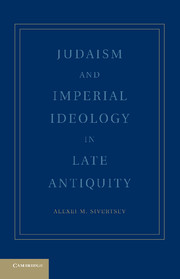Conclusion
Published online by Cambridge University Press: 01 June 2011
Summary
Tn conclusion, a few words remain to be said about the broader historical, cultural, and religious implications of Jewish eschatological narrative. The seventh and eighth centuries a.d. witnessed the defeat of the Byzantine Empire at the hands of Muslims; its gradual disintegration and the loss of such vital territories as Palestine, Egypt, Syria, and North Africa; and finally the Iconoclast policy of Byzantine emperors. The sense of failure triggered a variety of responses. On the one hand, the notion of the Church being a distinct entity no longer associating itself with an empire but rather asserting its own universalism gained momentum not only in the Latin West but also in the now Muslim East. On the other hand, a variety of political and religious ideologies looked forward to the restoration of the Roman Empire and its phoenix-like renewal. Most Byzantine apocalyptic narratives produced in the centuries immediately following the collapse belonged to the second category. They called for the miraculous revival of the empire and the restoration of its triumphant universalism, envisioning both of them as final steps leading toward direct divine rule on earth.
Remarkably, many restorationist ideologies envisioned the impulse for the restoration of the empire coming not from Constantinople nor even, for that matter, Rome. It appears that Syriac Ps.-Methodius was composed, among other things, to argue against the widespread view that the restoration of the empire would come from Ethiopia.
- Type
- Chapter
- Information
- Judaism and Imperial Ideology in Late Antiquity , pp. 213 - 218Publisher: Cambridge University PressPrint publication year: 2011



